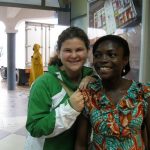We take for granted the things that always seem to be there. Water, for instance, was never something that I thought could become a necessity. Hot water for showers is something that I miss back home. Here in Ghana, cold showers are typical. The hot and sweaty days here are perfect for that though. The things I have in my backpack are all necessities. My phone, laptop, iPad, hard drive, flashlights, sanitizer for my hands, these are just things that we’re used to having around us. Then I met a young man named Kofi.
Before I came across Kofi, we had ventured out from our home in Accra for another weekend trip to Kumasi. The Kumasi region brought us closer to the lives of Ghanaian craftsmen, traders, and entrepreneurs. After a few long hours on uneven grounds, our bus arrived at the back of a building that revealed a small structure that resembled a house more than a building. We were met by dozens of bewildered children, looking to get a glimpse of the faired-skin obrunies waiting to be relieved by the opening doors of the bus. As we made our way out, older boys that looked to be in their teens approached us. They befriended us with questions of our names and where we were from — our recent experiences warned us not to be so quick to befriend them back. It was a sales tactic to get our names and create gifts that they would force upon us to buy once we returned to the bus.
A few weeks in Ghana and you’ll realize how easily it is to be hooked into a sale. Sympathy tends to be the key to attract foreigners. Whether it is making a donation, sponsoring a child who needs supplies, or someone selling you a seashell with your name and a note on it, you have to look forward and just say, “No, thank you,” as quickly as confidently as you can while you shimmy through the crowd of people.
Once we got inside, the house revealed a collection of colorful tapestries and spools that encapsulated the walls and floors of the dimly lit place. Vibrant reds, yellows, greens, and blues all formed into blankets, scarves, hats and shirts. It was difficult not to be astounded. We were drawn to a man working on a blanket. He used a machine that looked very medieval with its uneven wooden edges and lines of thread that protruded from every which corner. The man next to him gave us a presentation about the history and development of Kente cloth. A rich tradition as well as a quality cloth that was special to the people of the Kumasi region.
I began venturing around to see what things I could potentially buy. A young man stopped me. He had on a big bright smile and while he asked me what my name was, he continued to tinker a bracelet. His name was Kofi Charles; Kofi because he was born on a Friday and Charles as his born Christian name.
The bracelet he was working on was something that I had wanted to get for a few friends back home, so I engaged in conversation. He was persistent, very much like all the Ghanaian sellers. While we spoke, we were being approached and shouted at by other sellers inside and outside of the house. I was a bit overwhelmed and thought about leaving.
As we continued to talk, he had told me that he had been crafting for 15 years. He looked very young and I thought about how early he must have had to start working. He told me that he was only twenty-two. He had started making bracelets and other trinkets since he was seven. I thought about what I was doing at seven. Probably eating glue and attempting to tie my own shoes, let alone figuring out how to thread names into a bracelet.
The thing that stood out to me most about Kofi was his beaming optimism. He smiled the entire time we spoke and talked about how proud he was of his quality of work. I decided I would get a few bracelets for friends back home and I witnessed him conjure up two bracelets with the names “Sarah” and “Suzanne” all in a matter of minutes. It was quite remarkable that he was able to converse with me while twisting his hands and spinning thread like he was signing the words he was saying.
After he was done, I paid him (probably more than I should have) and continued to walk around. I noticed him approaching other students and being denied on his products. But yet, he kept that smile on his face and moved on. I ran into him again before we all left there. He offered to take a picture with me and so we did. He requested anything to remind him of me. Sadly, I had nothing to offer. As the bus left, I waved to him one last time. He frowned for a brief second, and smiled again.
I was a bit upset knowing I couldn’t give him anything to remember me by, but I left there having met someone with an optimism that I had never seen before. He had a skill to make things and for the next 15 years he would develop an infectious personality. It reminded me that you can’t quite choose the life you’re born into, but you can choose how to live the life you have.



Comments by jaclynr